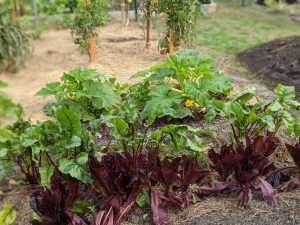Nice weather for golfing, tennis, and boating likely means clear skies – great for you but not so much for your veggie plants. Likely your plants are hoping you remember to give them a drink of water. In many places- there is a phrase- April showers bring May flowers. Here in sunny Florida- there is typically a lack of April showers. If you garden vegetables here it is important to know you can still be Florida-Friendly and conserve water with three simple considerations for your home vegetable garden.

1. Mulching your beds
Mulching your beds with coastal hay, pine straw, moss, and even wood chips (in a pinch) can help you reduce evaporation and also reduce plant stress. Mulching helps stabilize soil temperature so it doesn’t vary as widely which can sometimes stress plants. Mulching also reduces evaporation and it has an added benefit of reducing the splashback of soil-borne plant diseases onto your plant foliage. To learn more about mulching your vegetable garden, navigate to our Edible Gardening Series catalog of videos, blogs, and references. Episode 04: Mulching offers a video about mulching considerations for the edible garden and even more information about mulching your vegetable garden can be found here. If you are looking to learn more about mulch, like the variety of mulches, how to estimate how much you need, and how to install, read more here: https://gardeningsolutions.ifas.ufl.edu/care/planting/mulch.html
2. Update your watering habit
Another way to conserve water is to explore how much water your vegetable plants actually need, how often, and how best to apply it. Basically, you don’t want to water the foliage so don’t waste your water there. Also its best not to water from 10am-4pm as most of the water is lost to evaporation. Larger established plants may need less frequent watering but for a longer duration while young seedlings may need less water but more frequency. Like babies with small stomachs are fed smaller meals more often, young plantings can be similar in that way. To signify distress typically babies would cry or dogs would bark, but plants are silent and require you to observe them to know what they need. To learn how to identify water-related stress, what types of plantings require more or less water, and various ways to irrigate your home veggie garden you can read this new publication free online Efficient Irrigation for Florida-Friendly Edible Landscapes. Once on that page be sure to click on ‘show tables’ towards the upper right to view the full article with the handy tables.
If you prefer video you can also watch Episode 8: Watering Your Garden in the Edible Garden Series. If we are fortunate to have April rains- using a rain gauge can help you track if you still need to water or if you can skip it. To learn how to install and use a rain gauge as well as DIY irrigation videos, and more- visit our water resources page. While prudent to not waste our water resources conscientiously watering your vegetable and fruiting plants means your plant can absorb water and nutrients that you will enjoy eating. In turn, that fresh produce hydrates and energizes you.
3. Increase the organic matter in your soil
Increase the organic matter in your soil. Doing so can help with water and nutrient retention so less is leached out into our water resources. You can reduce how much water and fertilizer your garden needs as well as help control impacts from nematodes by increasing your organic matter. Shifting your efforts to composting or tending cover crops with less time watering and fertilizing. Tips to understanding your soil and ways to add organic matter can be found here.
For a great introduction to vegetable gardening including information about watering, mulching, and more watch the School Gardens: Organic Veggie Gardens 101
If you are ramping up your gardening and are wanting to delve even deeper to explore farming or other agricultural ventures there is a new series coming up in April. Becoming a Farmer flyer
To learn more about how to make compost, how to conserve water, and more…check out our upcoming classes listed on Eventbrite.
You can also enjoy A handout about conserving water in your vegetable garden
 1
1
